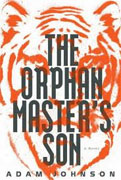The Orphan Master's Son
Adam Johnson
book reviews:
· general fiction
· chick lit/romance
· sci-fi/fantasy
· graphic novels
· nonfiction
· audio books
· author interviews
· children's books @
curledupkids.com
· DVD reviews @
curledupdvd.com
newsletter
win books
buy online
links
home
for authors
& publishers
for reviewers

 |
The Orphan Master's Son Adam Johnson Random House Hardcover 464 pages January 2012 |
|
Timing matters. Two years ago, a spectacular book movingly described conditions in repressive North Korea. The stunning
Nothing to Envy was nominated for the National Book Award, but despite critical acclaim, the book sadly didn’t make any inroads onto the bestseller lists. Now, two years later, a work of literary fiction, The Orphan Master's Son
The book traces Jun Do’s path from these relative humble beginnings to the point where he is mingling with the country’s super-elite. Jun Do is sent on a national diplomatic mission to Texas, where he gets a glimpse of what life on the other side of the iron curtain is like. Here he also manages to pick up a DVD of the classic Casablanca, a movie that moves him deeply and one he can readily relate to. Jun Do also eventually gains access to the woman he loves, the incredibly beautiful national actress Sun Moon, and even to the “Dear Leader” Kim Jong Il. Author Adam Johnson, a professor of creative writing at Stanford University, visited North Korea for research on this book and it shows. The country comes alive through the people it portrays, and the horrors the regime subjects its citizens to—where the layperson is scared to voice his feelings even to his own family—are on full display here. The Orphan Master's Son The Orphan Master's Son In the end, it is to Johnson’s credit that he has delivered a masterful novel which is sure to find a wide audience. Stories such as these deserve that reach. If you can stomach it, read Nothing to Envy as well, to get a comprehensive look at the country. Demick’s portrayal of real North Korean citizens remains indelible, and Johnson’s novel is a fitting complement to that masterful work. In one of many moving scenes in The Orphan Master's Son It is no surprise that Jun Do’s favorite movie is Casablanca—the greatest movie ever made, he says. The overriding theme of the movie—that of personal sacrifice—is a principle that Jun Do lives by even if it might lead to his eventual unraveling. “In America, people’s stories change all the time. In America, it is the man who matters,” writes Johnson. Contrast this to North Korea, where what mattered was not the man, but his story. “If a man and his story are in conflict, it is the man who must change.” As Jun Do finds out, any North Korean man can be made pliable enough to fit into a narrative already laid out for him. Originally published on Curled Up With A Good Book at www.curledup.com. © Poornima Apte, 2012 |
|
|
|
 Click here to learn more about this month's sponsor! |
|
| fiction · sf/f · comic books · nonfiction · audio newsletter · free book contest · buy books online review index · links · · authors & publishers reviewers |
|
| site by ELBO Computing Resources, Inc. | |
